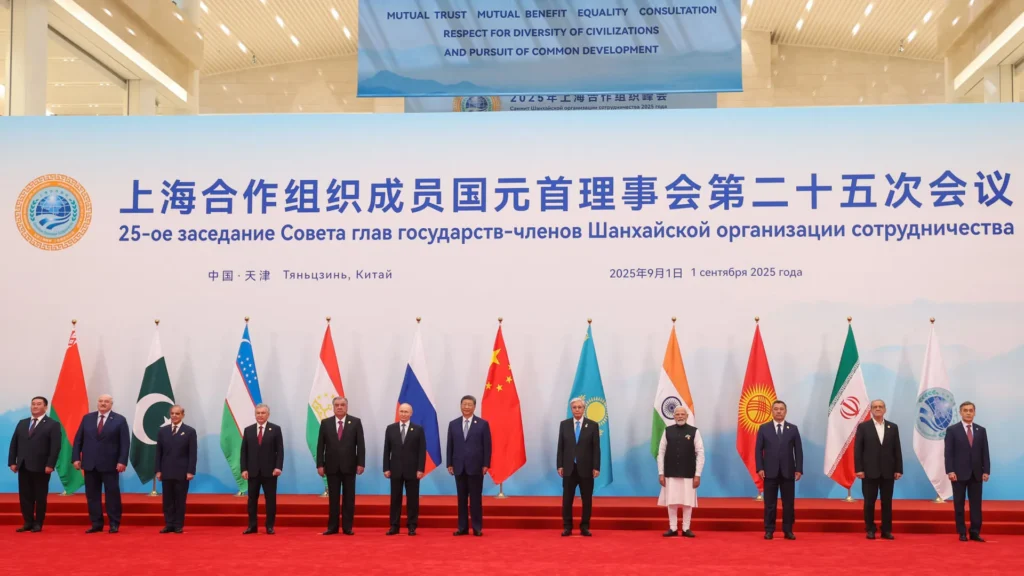Eurasia Realigns in Face of Late-Stage Barbarism: The New Post-Western World Order
ASIA--PACIFIC, 15 Sep 2025
Michael Hudson | Geopolitical Economy – TRANSCEND Media Service
At the Shanghai Cooperation Organization (SCO) summit in China, Eurasia discussed a new international economic order based on mutually beneficial trade and investment.
9 Sep 2025 – The Shanghai Cooperation Organization’s meeting in Tianjin, China on September 1 took a remarkable step forward in defining how the world will be dividing into two great blocs, as Global Majority countries seek to free their economies not only from Donald Trump’s tariff chaos, but from the U.S. government’s increasingly Hot War attempts to impose unipolar control on the entire world’s economy, by isolating countries seeking to resist this control with trade and monetary chaos, as well as direct military confrontation.
The SCO meeting became a pragmatic forum to define the basic principles that are to replace other countries’ trade, monetary, and military independence from the U.S. with mutual trade and investment among themselves, increasingly isolated from reliance on U.S. markets for their exports, U.S. credit for their domestic economies, and U.S. dollars for trade and investment transactions among themselves.
The principles announced by China’s President Xi, Russian President Putin, and other SCO members set the stage for spelling out in detail the principle of a new international economic order along the lines that were promised 80 years ago at the end of World War II, but that have been twisted beyond all recognition into what Asian and other Global Majority countries hope will have been just a long detour in history away from the basic rules of civilization and its international diplomacy, trade, and finance.
It really should not be surprising that not a word of these principles or their motivation has appeared in the mainstream Western press. The New York Times depicted the meetings in China as a plan of aggression against the United States, not as a response to U.S. acts.
President Donald Trump summarized this attitude most succinctly in a Truth Social post directed at President Xi: “Please give my warmest regards to Vladimir Putin, and Kim Jong Un, as you conspire against The United States of America.”

U.S. press coverage of the SCO meetings in China presents a foreshortened perspective that reminds me of the famous Hokusai etching of a close-up tree in the foreground completely overshadowing the distant city in the background. Whatever the international topic is, it’s all about the United States. The basic model is a foreign government’s adversity toward the United States, with no mention of such policies being a defensive response against U.S. belligerence toward the foreigner.
The press treatment of the SCO meetings and its geopolitical discussions has a remarkable similarity with its treatment of NATO’s war against Russia in Ukraine. Both events are seen as if they are all about the United States (and its allies), not about China, Russia, India, Central Asian nations, and other countries acting to promote their own attempts to create orderly and mutually beneficial trade and investment.
Just as the war in Ukraine is depicted as a Russian invasion (with no mention of its defense against NATO’s attack on Russia’s own security), the SCO summit in Tianjin and subsequent meetings in Beijing were depicted as confrontational scheming against the West, as if the meetings were about the United States and Europe.
On September 3, the German chancellor, Friedrich Merz, called Putin “the most serious war criminal of our time,” as it was Russia that attacked innocent Ukraine, not vice versa from the 2014 coup onward. As Putin commented on Merz’s accusation: “we do not assume that any new dominant states should appear. Everyone should be on an equal footing.”
The military parade in Beijing that followed the SCO meeting was a reminder to the world that the international agreements that created the United Nations and other organizations at the end of World War II were supposed to end fascism and introduce a fair and equitable world order based on the United Nations’ principles. To depict this frame of the meetings as a threat to the West is to deny that it is the West itself that has abandoned and indeed reversed the seemingly multilateral principles promised in 1944-45.
The U.S. and European treatment of the SCO meetings as shaped entirely by antipathy toward the West is not merely an expression of Western narcissism; it was a deliberately censorial policy of not discussing the ways in which an alternative to U.S.-sponsored neoliberal economic order are being developed.
NATO head Mark Rutte made it clear that there was to be no thought that there even was such a thing as a policy by countries to create an alternative and more productive economic order, when he complained that Putin was getting too much attention. That meant not to discuss what really happened in China – and how it is a landmark in introducing a new economic order, but not one that includes the West.
President Putin explained in a press conference that confrontation was not at all the focus. The speeches and press conferences spelled out the details of what was necessary to consolidating relations among themselves. Specifically, how will Asia and the Global South simply go their own way, with minimum contact and exposure to the West’s aggressive economic and military behavior.
The only military confrontation that is threatened is by NATO, from Ukraine to the Baltic Sea, Syria, Gaza, the South China Sea, Venezuela, and North Africa. But the real threat is the West’s neoliberal financialization and privatization, Thatcherism and Reaganomics.
The SCO and BRICS (as are now being discussed in follow-up meetings) want to avoid the falling living standards and economies as the West deindustrializes. They want rising living standards and productivity. This attempt to create an alternative, more productive plan of economic development is what isn’t being discussed in the West.
This great split is best epitomized by the Power of Siberia 2 pipeline. This gas was planned to go to Europe, feeding into Nord Stream. That has all ended. Siberian gas will now go to Mongolia and China. It powered European industry in the past; now it will do the same for China and Mongolia, leaving Europe to depend on U.S. LNG exports and declining North Sea supplies at much higher prices.

A map of the Power of Siberia 2 pipeline from Russia to China
Geopolitical upshots of the SCO meeting
The contrast between the successful consolidation of SCO/BRICS trade, investment, and payments arrangements and the U.S. destabilization makes it difficult for countries to try to join both the US/NATO bloc and the BRICS/Global South countries.
The pressure is especially strong on Turkey and Saudi Arabia. They were invited to join BRICS, and the Arab countries are especially financially exposed to the dollar and also host U.S. military bases. (India has reportedly blocked Azerbaijan from joining the SCO, due to its close ties to Pakistan.)
Two dynamics are at work. On the one hand, the BRICS and Global Majority are trying to defend themselves against US/NATO economic aggression, and to de-dollarize their economies so as to minimize trade dependence on the U.S. market. That saves them from the U.S. weaponizing its foreign trade and monetary system and from blocking their access to supply chains that have been put in place, thereby disrupting their economies.
The other dynamic is that the U.S. economy is becoming less attractive as it polarizes and shrinks, as a result of its financialization and rising debt overhead. It is becoming inflationary, subject to a debt-leveraged financial bubble that is at increasing risk of sudden collapse.
This basic moral contrast catalyzes the contrast of economic systems and policy between oligarchic privatized and financialized markets (neoliberalism) and industrial socialist economies. This socialism is the logical extension of the dynamic of early industrial capitalism, seeking to rationalize production and minimize waste and unnecessary costs imposed by rent-seeking classes demanding income without playing a productive role – landlords, monopolists, and the financial sector.
The great problem, of course, is that the Americans want to blow up the world if they can’t control it and dominate all other countries. Alastair Crooke warned that the Evangelical Christian movement sees this as an opportunity for a conflagration that will see Jesus return and convert the world to Christian jihadism.
The term “late-stage barbarism” is now being used throughout much of the internet for the ethnic-supremacy fanaticism, ranging from Wahhabi jihadists and al-Qaeda breakoffs, through Gaza and the West Bank, to the Ukrainian neo-Nazi revival (with its echoes in Germany’s hatred of Russia) not seen since the Nazism of the 1930s and ‘40s, denying that their opponents are fellow human beings.
As an alternative to the SCO, BRICS, and Global Majority, this defines the depth of the split in today’s geopolitical alignment.
____________________________________________
 Michael Hudson is President of The Institute for the Study of Long-Term Economic Trends (ISLET), a Wall Street Financial Analyst, Distinguished Research Professor of Economics at the University of Missouri, Kansas City and author of The Bubble and Beyond (2012), Super-Imperialism: The Economic Strategy of American Empire (1968 & 2003), Trade, Development and Foreign Debt (1992 & 2009) and of The Myth of Aid (1971). You can follow his work at michael-hudson.com
Michael Hudson is President of The Institute for the Study of Long-Term Economic Trends (ISLET), a Wall Street Financial Analyst, Distinguished Research Professor of Economics at the University of Missouri, Kansas City and author of The Bubble and Beyond (2012), Super-Imperialism: The Economic Strategy of American Empire (1968 & 2003), Trade, Development and Foreign Debt (1992 & 2009) and of The Myth of Aid (1971). You can follow his work at michael-hudson.com
Go to Original – geopoliticaleconomy.com
Tags: Asia and the Pacific, BRICS, Central Asia, China, East Asia, India, Multipolar World Order, New World Order, Russia, SCO, Shanghai Cooperation Organization, West
DISCLAIMER: The statements, views and opinions expressed in pieces republished here are solely those of the authors and do not necessarily represent those of TMS. In accordance with title 17 U.S.C. section 107, this material is distributed without profit to those who have expressed a prior interest in receiving the included information for research and educational purposes. TMS has no affiliation whatsoever with the originator of this article nor is TMS endorsed or sponsored by the originator. “GO TO ORIGINAL” links are provided as a convenience to our readers and allow for verification of authenticity. However, as originating pages are often updated by their originating host sites, the versions posted may not match the versions our readers view when clicking the “GO TO ORIGINAL” links. This site contains copyrighted material the use of which has not always been specifically authorized by the copyright owner. We are making such material available in our efforts to advance understanding of environmental, political, human rights, economic, democracy, scientific, and social justice issues, etc. We believe this constitutes a ‘fair use’ of any such copyrighted material as provided for in section 107 of the US Copyright Law. In accordance with Title 17 U.S.C. Section 107, the material on this site is distributed without profit to those who have expressed a prior interest in receiving the included information for research and educational purposes. For more information go to: http://www.law.cornell.edu/uscode/17/107.shtml. If you wish to use copyrighted material from this site for purposes of your own that go beyond ‘fair use’, you must obtain permission from the copyright owner.
Join the discussion!
We welcome debate and dissent, but personal — ad hominem — attacks (on authors, other users or any individual), abuse and defamatory language will not be tolerated. Nor will we tolerate attempts to deliberately disrupt discussions. We aim to maintain an inviting space to focus on intelligent interactions and debates.
